There’s a big interoperability problem you don’t know you have. Is your organization ready? The countdown to compliance is on.
The CMS Interoperability and Patient Access Final Rule is effective July 1, 2021. This enforcement extension is a result of the impact that the COVID-19 pandemic is having on the healthcare industry.
By April 5, 2021, the 21st Century Cures Act program rule on Interoperability, Information Blocking, and the Office of the National Coordinator for Health IT (ONC) Health IT Certification will go into effect – bringing penalties and enforcement actions to those who aren’t in compliance and leaving them behind in the marketplace with no competitive edge.
In this post, we will provide an all-encompassing rundown of the 21st Century Interoperability requirements, including why it is important, how you can take action, and how BookZurman can help you now and in the future.
Although it has several monikers...
...the rule mandates that all patients have free and immediate access to the health information available in their electronic health record. Sounds good, right? Not if your organization is information blocking and doesn't even know it. If you are found to be information blocking (even inadvertently), you'll incur monetary penalties and enforcement actions, and delay your ability to do business with the Centers for Medicare & Medicaid Services (CMS).
On a positive note, compliance with the rules means increased data-sharing leading to better care coordination and quality outcomes – along with transparency increasing patient trust and satisfaction.
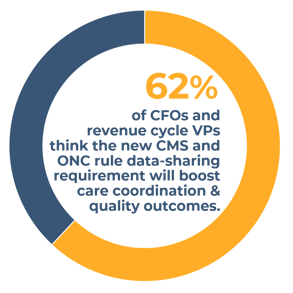
In a recent study,1 30 executives were polled from large health systems – primarily CFOs and revenue cycle VPs. The report found that 62% of respondents think the new CMS and ONC rule data-sharing requirement will boost care coordination and quality outcomes.
They also recognized the need to invest in consumer experience, and indicated plans to develop new online scheduling capabilities (70%), cost estimation apps (53%) and payment financing options (53%), according to the report.
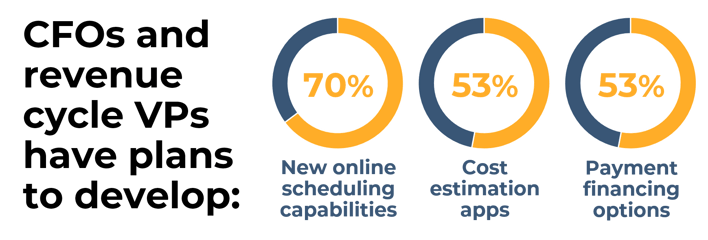
1 Phelps, A., Skalka, C., Gerhardt, W., & Chang, C. (2021, January 25). Greater transparency and interoperability in health care: Uncover strategic opportunities for health systems. Deloitte Insights. https://www2.deloitte.com/us/en/insights/industry/health-care/health-care-pricing-transparency-operability.html
Healthcare providers, health information networks, and health IT developers of certified health IT are mandated to ensure they comply by July 1, 2021. Beyond compliance, adopting 21st Century Interoperability uses the forward momentum of the industry to improve your infrastructure and how you do business for a better patient experience and return on investment (ROI), and with less provider burden.
Don’t fall behind! Healthcare providers do not want – and cannot afford – to scramble at each health IT regulatory step. Instead, they need to adopt a long-term plan to meet compliance deadlines and create a competitive edge to success in the future of health.
The future is here and if you do not take action now, your business will suffer (and the care you provide will too). The sprint to compliance is also a sprint to stay or become competitive in the marketplace, and doing nothing sets you back — making it harder to catch up. The fact is, we are collectively accelerating to compliance, so if you are moving at the same pace, you are moving backwards … and will be left behind.
You do not want to scramble at each health IT regulatory step but, instead, adopt a long-term plan that will help you meet deadlines and create a competitive edge to success in the future of health. Are you confident that your EHR vendor has set your organization up for success? How do you know? With so many nuances to the 21st Century Cures Act information blocking provisions, it takes a robust understanding of the rules themselves and your systems to ensure you are in compliance.
It’s not as simple as it may seem on the surface, so don’t be lulled into a false sense of security that you’re compliant and have no liability, you may be inadvertently information blocking. Now is the time to work with objective experts and specialists in standards and interoperability to ensure compliance with 21st Century Cures Act information blocking provisions and a create a roadmap to implementing 21st Century Interoperability. It’s vital to uncover and identify your organization’s health IT needs and desires, as well as empower your organization with this competitive edge.
Providers and health IT leaders often operate in silos from other areas of healthcare IT. They are too busy with their extraordinary daily duties to recognize the nuances of how HIT provisions and standards can improve patient care and their bottom line. However, providers and health IT leaders who operate without awareness or education on the provisions will make expensive and obsolete decisions that affect their business long term when it comes to IT infrastructure, systems, tools, and more.
As the industry travels on CMS’ path for change, CMS has the power to turn interoperability infrastructure into something everyone knows about. A past example of this is electronic claim processing, which nobody really heard of until HIPPA, and then the industry adopted this practice as they were mandated to send insurance claims electronically. CMS’ plan continues to move forward, hitting milestones along the way, so providers and healthcare IT leaders can choose to:
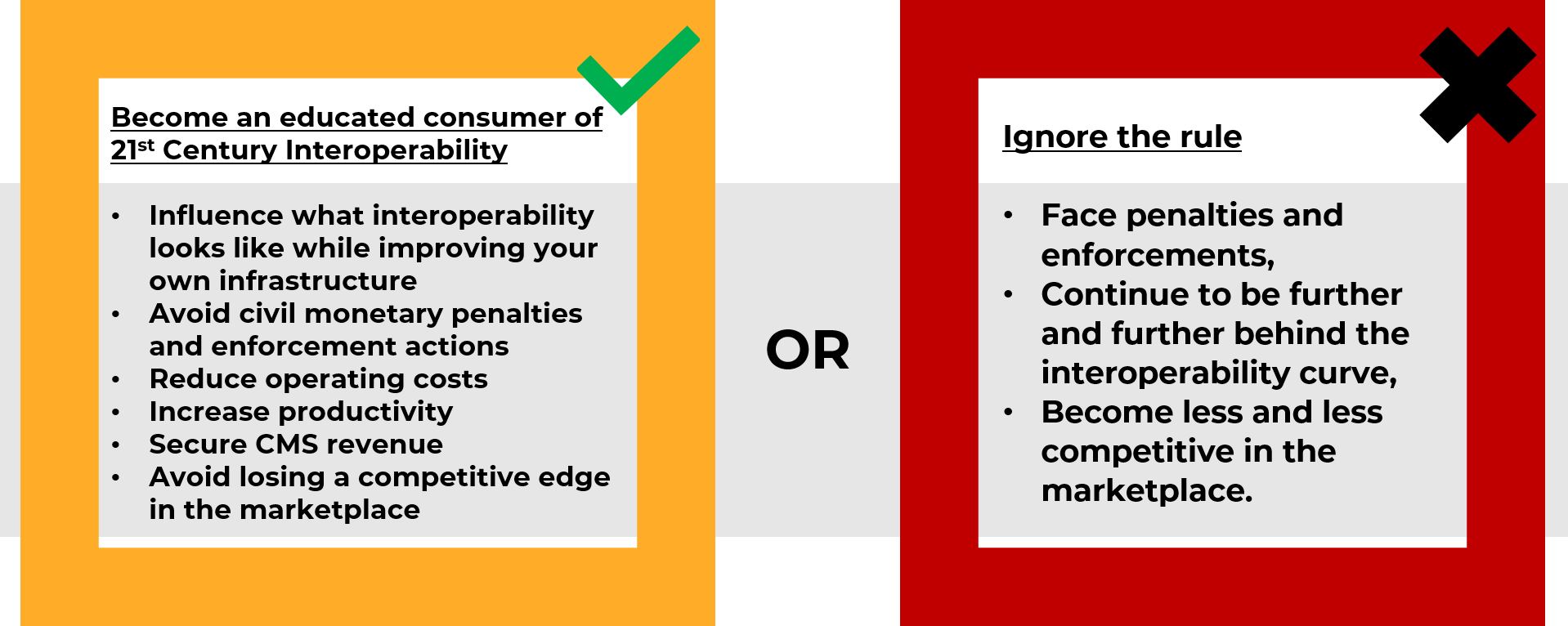
Things are only going to get more interesting and complex as the years go by, especially if providers and healthcare IT leaders do not start complying now.
A reactive approach to healthcare IT is about to cost you. Comply now to avoid penalties and enforcement actions for information blocking, and risk being behind the interoperability curve. Compliance with CMS and ONC’s new rules may feel like a burden, but when handled right, they can reduce some of yours. What’s more, information blocking goes along with Accountable Care Organizations (ACO) that have to report, and supports research and value-based payment models. There is potential for incentives tied to measurable improvements in patient care quality.
Some reasons why you’re in the dark:
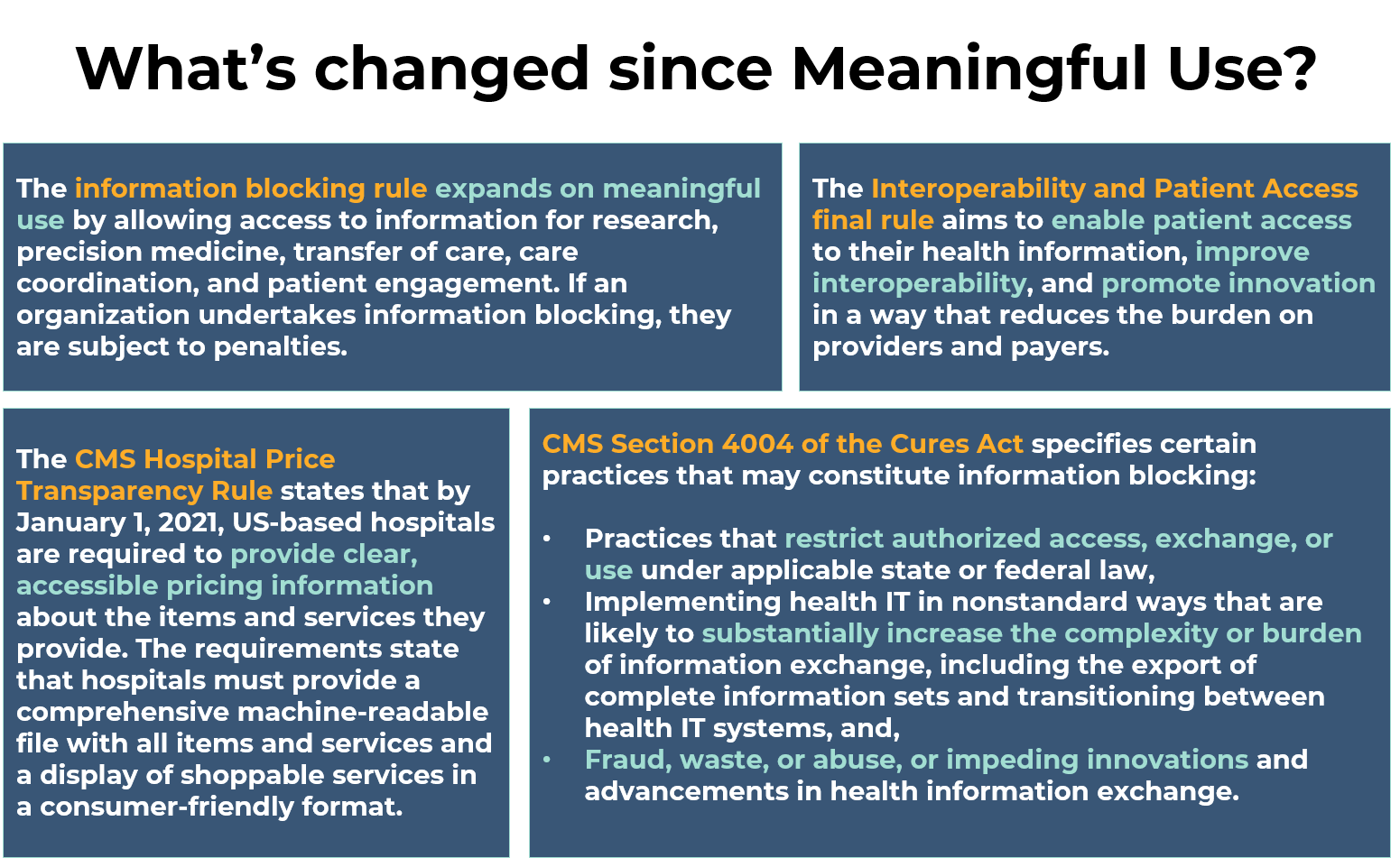
It is important to work with experts who are continuously connected to the healthcare standards and the interoperability community for a roadmap to compliance and implementation guidance. At BookZurman, we have been part of creating and testing these rules in the federal sector and understand the nuances of the rule that may benefit you and help you achieve your business goals more holistically.
Unsure you’re information blocking? We can help.
We can help you feel relieved that there is someone out there who can provide clarity and a custom roadmap to compliance in time for the provisions to go into effect.
You can take comfort in trusting an objective partner who has been involved in the development in the federal sector, and is continuously connected to the HIT standards and interoperability community to help you comply and take advantage of efficiency and improvements in health information exchange. We have faith that with our help, you will be ahead with evolving rules and current communicated milestones, and not fall behind with additive requirements.
Take action by booking a discovery meeting with Team BZ experts to determine your compliance readiness for the 21st Century Cures Act information blocking provisions.
Team BZ has been a consistent, active leader in driving the state of healthcare standards with more than a decade of uninterrupted engagement with a specialized focus in the health IT community. Our leading position affords us an unparalleled expert-level understanding of the needs, desires, and requirements of the healthcare IT community. Collectively, our team has more than 100 years of healthcare/IT experience.
While the broader healthcare IT industry has been thinking about and planning for 21st Century Cures Act provisions to go into effect, we have been actively shaping the technical specifications that describe this infrastructure. We have been actively working on the specifications that describe what the interoperability infrastructure will look like in support of federal agencies. We are in a unique position to transfer this unique and valuable knowledge to provider organizations and healthcare IT leaders in the private sector. Our team has been creating specifications, testing to make sure the plans are implementable, piloting, and looking at issues coming down the pipe. We are involved in the nitty gritty details of what the interoperability infrastructure will do from a technical specification standpoint and have policy level contacts and the network to help providers and healthcare IT leaders with very nuanced and specific questions.
What’s more, BookZurman is an award-winning healthcare standards and interoperability consulting group helping bridge the gap between healthcare and technology for a better patient experience. Our industry-leading team of domain-specific subject matter experts brings an unparalleled breadth and depth of experience to government, industry and community partners to help their systems and projects stay ahead of the technology curve and maximize longevity and return for their IT investments.
As an educated organization adopting 21st Century Interoperability infrastructure, Team BZ can help you:
As an integrated provider of information technology and digital architecture consulting services, our core competencies include work in standards and interoperability, informatics architecture, clinical decision support, and terminology.
We have worked, since 1996, with government, industry and community partners, helping bring their systems and projects to the leading edge of healthcare IT. BookZurman has played a vital leadership role for similar health IT rules, such as the CMS Final Rule, including:
Created and evolved standards-based processes and systems:
Determine additional approaches to improve efficiency and processes beyond what is required in the regulations. Use the forward momentum of the industry to improve your infrastructure and how you do business.
Employ targeted initiatives and capabilities for improving the drivers of health/social determinants of health, care management for people with chronic conditions, automation opportunities, and streamline result reporting. Reach out to your partners to help you understand their interoperability needs, and assess your vendor landscape to ensure they can add to your capabilities and enable longer-term strategies.
BookZurman has been contributing for over a decade to interoperability standards in health IT, working directly with the Veterans Health Administration to advise on development and implementation as a Service-Disabled Veteran-Owned Small Business (SDVOSB). Continuously connected to the health IT community, we provide industry leadership and active participation through leading-edge organizations and have played a vital leadership role for health IT rules and policy.
We can:
BookZurman can build the technology and infrastructure that will transform your healthcare delivery while saving you headaches and millions of dollars over time by working with an experienced and connected interoperability partner.
The Centers for Medicare and Medicaid Services (CMS) developed and are following a roadmap to compliance3, even if some areas are delayed. Are you prepared for what’s next? Below, we’ve outlined the major milestones in play. Updates occur yearly so it is imperative to become compliant as soon as possible in order to keep things from getting more and more complex, and to prevent you from falling further behind the curve.
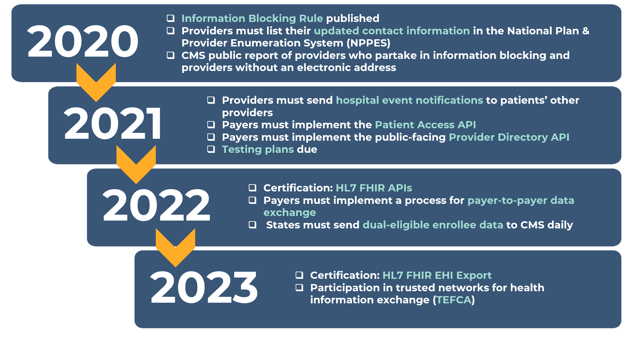
3 Centers for Medicare & Medicaid Services (CMS). (n.d.). CMS Interoperability Roadmap: A Proposed Rule to Help Patients Access their Health Information. https://www.healthit.gov/sites/default/files/facas/2019-04-10_CMS_Presentation_508.pdf
As an award-winning healthcare standards and interoperability consulting group, we can be your objective partner to bridge your gap between healthcare and technology for a better patient experience.
Our industry-leading team of domain-specific subject matter experts brings an unparalleled breadth and depth of experience to government, industry and community partners to help their systems and projects stay ahead of the technology curve, and maximize longevity and return for their IT investments.
Discover how we can help your organization get closer to compliance and adopting 21st Century Interoperability.